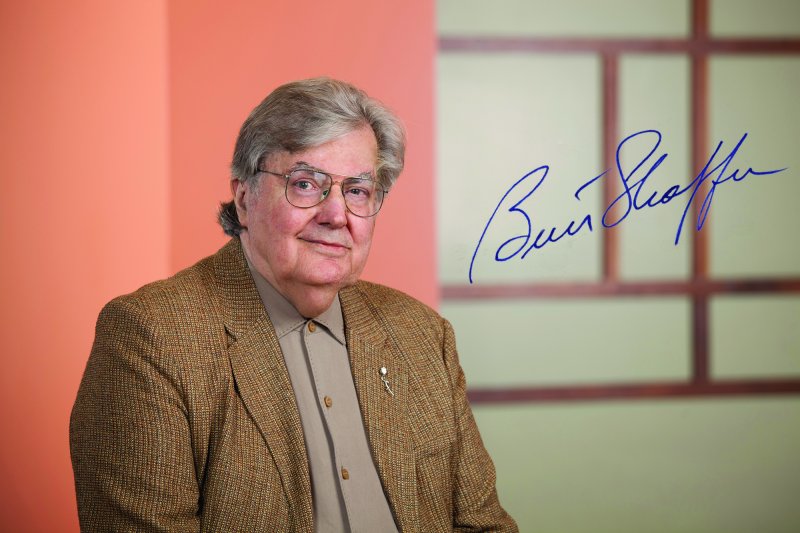A Tribute to Professor Emeritus Butler Shaffer
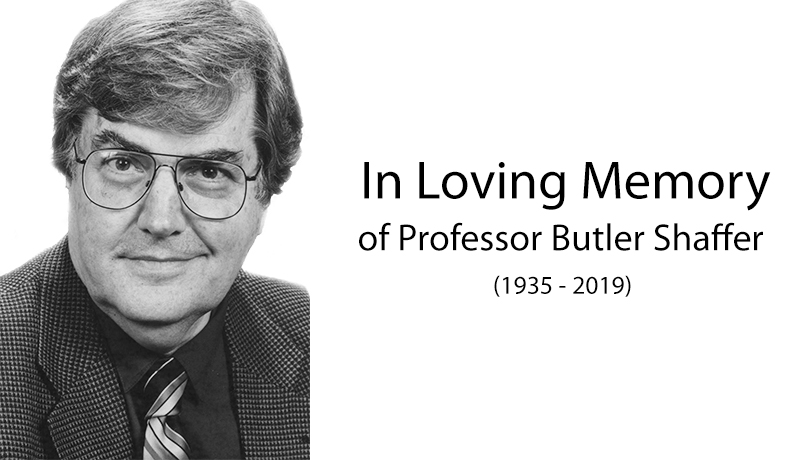
The attached remembrances by his colleagues at Southwestern Law School reflect the several ways Butler Shaffer influenced the School, its faculty, and students.
While Butler was a stickler for precision in any legal or political discussion inside or outside the classroom, he was also an understanding and generous friend.
All the remembrances speak to these aspects of his presence among us for 40 years and are a most fitting way to keep him in mind as we go into the future.
- Professor Robert Pugsley
I am privileged to be a friend and colleague of Butler Shaffer for several decades. Butler was a masterpiece of a human being. He was a singular person. I can’t say that Butler marched to the beat of a different drummer because I don’t think he liked drummers; he abhorred marching.
He was one of the founders of the Libertarian movement in the United States, with a global reputation that was built on his voluminous writings. He was one of the architects of the amazing thing called Southwestern’s Conceptual Approach to Legal Education (SCALE).
While some of us aspire to “sage on the stage” status, shoveling information to anyone who will listen, Butler prided himself on never having answered a student’s question in his forty years of teaching. He was a master at prodding students to think. Not with the Socratic method, a game only one can play, but seriously instilling in his students the need to “always ask why?” and engage in the practice of questioning their foundational personal beliefs as well as the views proffered by authority.
Butler was the soul of Southwestern. When he retired, Southwestern lost his insightful analysis and with his death, we have lost his continuing guidance.
- Professor Robert Lind
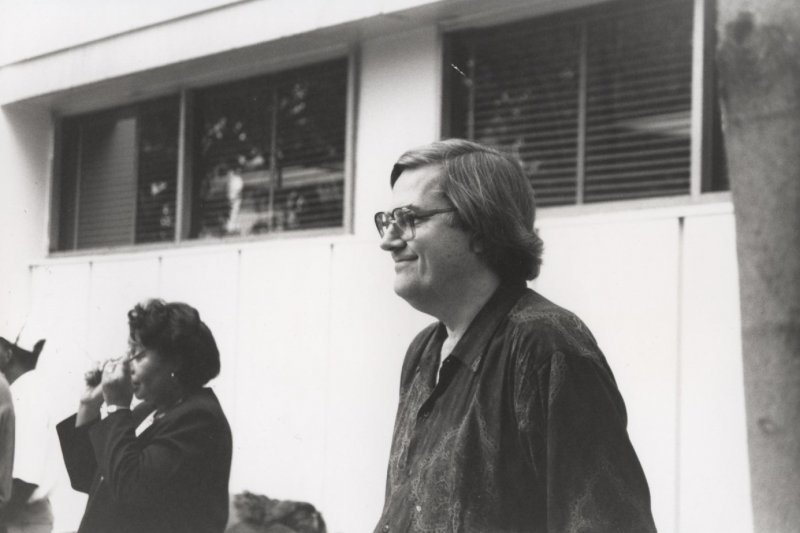
Butler joined the Southwestern faculty in 1977, one of the early, specially recruited, SCALE faculty. Butler took emeritus status in 2015 and a special reception, so thoughtfully planned by Professor Robert Lind and Dean Deb Leathers, was held in Butler’s honor in February 2017 on his retirement after forty years as a faculty member at Southwestern. That evening, I was struck by how many of Butler’s students over the generations had made special efforts to attend, each making clear the impact he had on them. In preparing my comments for the reception, I learned a great deal about Butler and the SCALE program. When I first met Butler, he made it absolutely clear that it was the SCALE program that lured him to Southwestern.
Former SCALE Director Darrell Johnson, who was not able to attend the reception, shared the following about Butler and SCALE in a voice directed at Butler- “when you told me the title of your first book, Calculated Chaos, I thought you were writing about development of the SCALE program and its faculty and I suggested that there was very little calculated about the chaos. The chaos did, however, result in a grand experiment of teaching methods, student/faculty roles, and interdisciplinary studies from which students and faculty all benefitted.” Darrell emphasized: “Your writing and teaching have pushed many to ask themselves what they think and then ask themselves why.”
In talking about his years teaching in the SCALE program, Butler said: “I have always believed that our priority, as a law school, is to help our students learn how to think, rather than teaching them what to think.”
Butler was a strong proponent of the Socratic method. In one of his emails to me, he said: “Many of my students have seen the value of my Socratic method of teaching [which] was reflected in one alum who told me, at his 10th-anniversary reunion: “When I was a student of yours, I hated your guts. Now that I’ve been out in practice for ten years, I think I learned more from you than from anyone else.”
Butler received his B.Sci. in Law in 1958 and B.A. in Arts and Sciences in 1959, from the University of Nebraska, Lincoln and his J.D. in 1961 from the University of Chicago. Butler was quoted as saying the reasoning and analytical skills that he developed in law school, where he served as associate editor of the law review, helped him pursue "the continuous process of inquiry that Socrates referred to as 'the examined life.'"
Butler received many awards during his time at Southwestern, including the 2011 Excellence in Teaching Award and a Lifetime Achievement Award in October 2012 - the Schlarbaum Prize -- from the Ludwig von Mises Institute. The Institute is a libertarian academic organization whose research and scholarship are focused in the fields of economics, philosophy and, political economy. The award is given each year to a “public intellectual or distinguished scholar” who has demonstrated a “lifetime defense of liberty.” Butler was also requested by Ron Paul to speak before thousands at the Ron Paul Rally that took place in Tampa before the August 2012 Republican Convention.
Butler touched the lives of so many within the law school during his 40 years at Southwestern.
With sadness and with admiration for all that Butler achieved and contributed,
Susan
My husband, Butler DeLane Shaffer, died of prostate cancer at 3:28 pm on Sunday, December 29. He had a peaceful transition surrounded by family and love, in a wonderful Burbank hospital where he had been a patient several times. He always looked forward to their practice of playing lullaby chimes throughout the hospital when a baby is born. We were with him for his last breath, his last heartbeat. And an hour later the western sky gave us its most beautiful sunset ever, all purple (his favorite color) and red and gold.
On December 28, our 62nd wedding anniversary, our three daughters told the world on Facebook that Butler's time on earth was limited. Almost immediately he began to receive dozens of messages of love and appreciation from people whose lives had been touched by his writing, his teaching, and his very presence. We read your words to him and felt on some level he heard them. Thank you all for your messages and know they are helpful to his family.
A British psychiatrist wrote that "Grief is the price we pay for love." We are paying that price now. Butler's ashes will be placed in a bench in Wyuka Cemetery in Lincoln NE where we both have ancestors. The bench is in the oldest part of the cemetery, just inside the entrance and his words on the bench can be seen from the road: "Civilizations are created by individuals. They are destroyed by collectives."
Butler had a special vibrant energy and if anyone could send a message from the grave, he would be the one. I am a confirmed skeptic, less spiritual than Butler who occasionally had prophetic dreams and firmly believed in Gremlins when something went wrong. But, on the day of and the day after his death, we had two strange occurrences that are probably just coincidence but do make us wonder. I received an Amazon package sent the day of his death with no paperwork enclosed. It was a singing bowl, something I would have wanted. Amazon tracking could give us no information, in fact, their records showed it should have been a clothesline and gone to a different address. And several hours after his death our oldest daughter was on her computer talking with a friend. Suddenly her iTunes opened up by itself. Thinking that was weird, she shut it down. Later she left the room. Returning to the room she heard music playing. iTunes was back up playing the Suzanne Vega song “Bound,” an album our daughter had bought several years ago, but never listened to. She had never heard the song before. The lyrics are here.
The song ends with the words “When I said: I am bound to you forever, here’s what I meant: I am bound to you forever.”
We always said Butler made us think and he made us laugh. So I know he would appreciate these words from one of our sons-in-law who helped to put things in perspective; given that he was in no discomfort, surrounded by his family and their love. "…we need to be reminded that this is better than taking an arrow in the chest during the Crusades surrounded by screaming enemies as you lie writhing in the mud.”
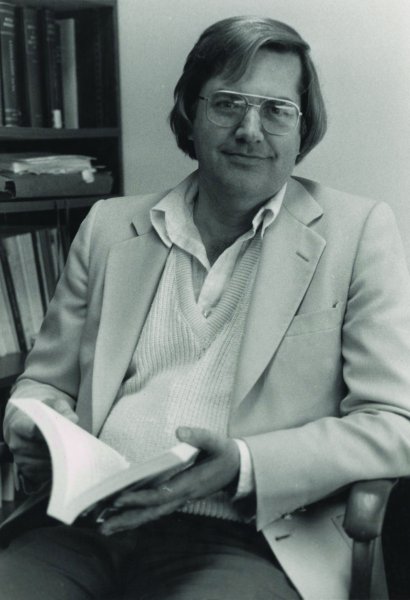
Butler was so special to all of us! Not long after I met him, when we were still in Westmoreland only, I was in the faculty lounge talking to Butler, Norm Karlin, and some other illustrious male colleagues, when Butler called me a feme-Nazi. I thanked him for the compliment, and everyone howled. How could you love a colleague who called you such names, but you could love Butler!
He was an outstanding teacher, and I have this on the good authority of one of his former students, my daughter Jackie. Jackie said that his exam was the most interesting exam she’d ever taken. And that was Butler: always interesting and full of fun.
I will miss him very much. I loved his definition of property as the ability to keep people out. But Butler never kept anyone out. He included all of us in his insights and good humor.
A Butler fan,
Judy
Butler's comic insight--puns, plays on words, etc.--was unrivaled. It was always fun to be on a committee with him.
Butler appreciated both sides of a position, and he could also look right through both of them them. He was a constant challenge to comfortable answers--challenging a position with an "Oh really?" that signaled another hypothetical was coming your way to force adjustments in thinking, or at least in the way you sat in your seat. But his challenges were not meant to defeat, but were meant to cast more light on an issue.
I'll certainly miss him.
Paul
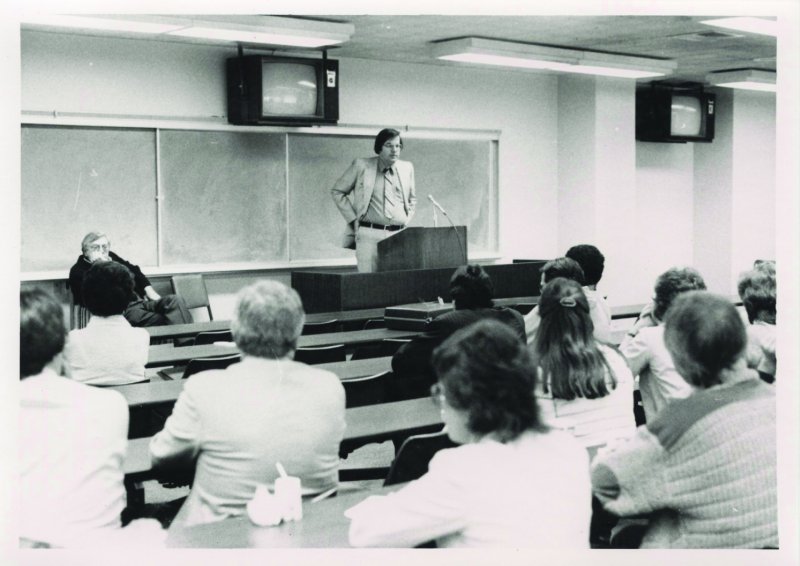
Butler Shaffer was a warm, funny, guy, full of love despite his cynicism about politics. I attended one of his Bob Cratchit affairs, very popular with students. Butler would attack Cratchit for his reliance on welfare, and rail against the political system, announcing his firm resolve never to vote again. Butler allowed me to stand up and read a low-quality limerick that made fun of his nihilism. The students laughed while Butler stood undaunted, probably pleased that I took the time to question his position.
Many students left Southwestern with Butler enshrined as their favorite professor. He made everyone he encountered think, even if they disagreed with his position. He was a very effective teacher.
Anyone doubting the love in this man’s heart needs only look to Jane, his daughters, and a wide circle of friends. I am happy to be counted as a friend, or at least I think I was. Even after retirement, Butler would continue to reach out with emails chiding me for believing that global warming was caused by human activity. But we really did enjoy the back and forth.
I will miss him.
In the Fall of 1988, I was a newly minted professor at Southwestern. Butler was always warm and engaging to me, so he invited me to his Fall event for law students where he praised Ebenezer Scrooge and castigated Bob Cratchit. I knew that Butler would use the occasion to urge people not to vote in the forthcoming Presidential election (Bush vs. Dukakis).
I asked Butler permission to read this limerick entitled “Ode to Butler Shaffer.” Below I have set forth the full text of the limerick.
Ode to Butler Shaffer*
There once was a man from Southwestern,
Who proselytized from a lectern,
He showed raw disgust,
For a system gone bust,
He knew we were due for a u-turn.
This Nebraska kid with his back hoe,
Tossed well-aimed dung from the back row,
Dukakis berated,
Quayle’s been castrated,
Bush, Bentson? They’re totally wacko.
Now politics no one will master,
To try will bring failure and faster,
Hope’s gone, oh alas,
Let’s stay home and pass gas,
The country’s a bloomin disaster.
With Butler there is no false piety,
His views have attained some notoriety,
Is this man a nihilist
Or merely a realist?
Join Butler’s famed ostrich society.
Politicians will stand there and gloat,
While the country’s just barely afloat,
The budget is sunk,
It’s best to stay drunk,’
It’s crazy, be lazy, why vote?
The ballot you cast has no clout,
The idiots will always win out,
So dump on democracy,
Choose aristocracy
Of negative nabobs of doubt.
Is Butler our man of the hour,
Who tastes that the pudding’s gone sour?
A dilettante’s whine
At the nation’s decline,
Or a movement beginning to flower
PAID FOR BY THE COMMITTEE TO DEFECT
*The Nebraskan Ode, overlooked by all but a few deviant scholars, has frequently been confused with a limerick.
Warren Grimes
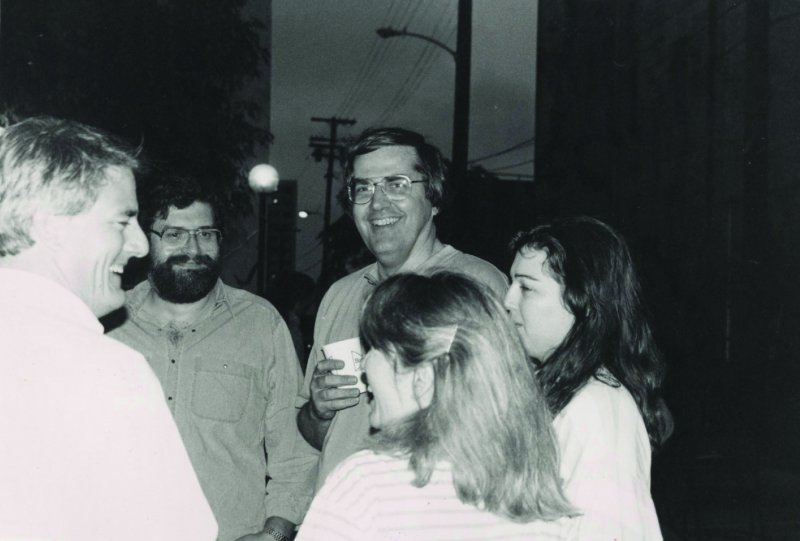
Butler and I often used to have discussions, not so much about property, but about the world. About life. One day, years ago, the subject of conspiracies came up, about people who think that those who believe in conspiracies are always “crazy,” to which Butler raised his voice, “Did these people [the anti-conspiracy people] ever hear of the Holocaust? The biggest conspiracy ever!”
Yes, I remember what Butler said, verbatim.
As I told Jane, Butler was more than a mensch (an honorable person). He was a tzadek (a righteous man).
Ira L. Shafiroff
I too have been saddened by Butler's passing. I was on the SCALE faculty with him and can say he was one of the main architects of the program, if not instrumental in its development.
Butler was always a hoot, an inveterate punster. And, though I hate puns, his were frequently entertaining. His sense of humor was on the surface. One of my favorite memories of him is when someone said "well . . ." he would say "that's a deep subject."
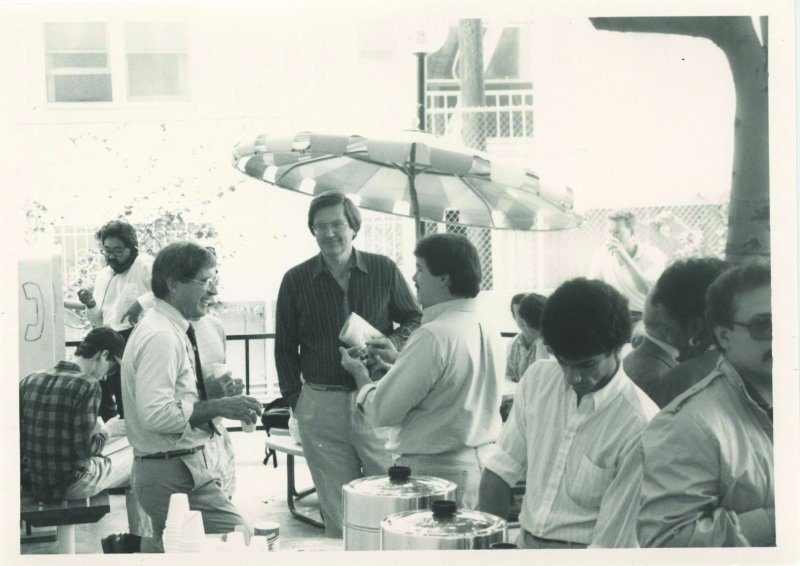
Butler and I were colleagues at Southwestern for 38 years, and friends for life. We had numerous political differences that led to greater thought on my part, but always “resolved” them only to differ again another day. I learned much from Butler, though I am quite uncertain the reverse was true.
I was a reliable (predictable?) foil each year when Butler tried to ruin our Christmas spirit by making the case for Scrooge and against poor Bob Cratchit. I was also the reliable target of many of his puns, jokes, and good-natured barbs.
Jane, Butler’s wife of 62 years, observed once that I was Butler’s younger brother—an unfounded charge I still contest. In turn, I reassured her that—given all that she endured in this life—she has a straight shot to heaven, her purgatory having already been served on this earth.
I will miss Butler greatly, but will try to follow his path by facing life each day as an adventure, one to be shared as much and as widely as possible. And he, in addition to being a widely esteemed public intellectual, always brought to his classroom an insistence on asking the fundamental questions in law and in life. His students always, some sooner than others, appreciated the gift of thought and reasoning he had given them.
May he, having lived a long and wonderful life,
now rest in peace and in our hearts.
Bob Pugsley
My experiences with Butler were along the same lines as those already shared by others. He had a very puckish personality, with his puns and his send-offs of various faculty members always done in a good-natured way. I still remember the almost life-sized cardboard likeness of Norm Karlin that Butler kept in his office and occasionally used as a prop in class. Norm and Bob Pugsley were frequent targets of his humor, and I am pleased to note that, according to my students, I, too, received such publicity from Butler, especially after Norm's passing. Indeed, Butler told me that I even received dishonorable mention in one of his exam questions! The villains always get the good parts. I shall cherish the memory.
But there was another way that I shall remain deeply indebted to Butler. I remember his kindness (and Jane's) for several years on an annual basis getting my family of 5 kids (at the time) deeply discounted or free entry to Disneyland at a difficult period personally for them and me. Those trips were special, and those now-grown kids remember those times still. Butler would drive to Anaheim and back just to get them into the park, with never any expectation other than a "thank you."
Joerg
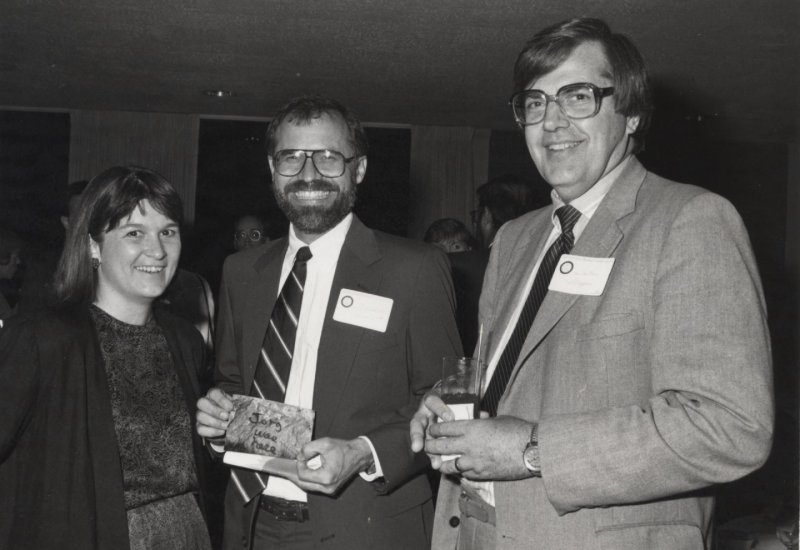
I too have great memories of times with Butler. We would often stop to talk in the halls or he might come by my office to discuss all matters of things. Our favorite was a shared distrust of politicians and the government. Then our agreement would dissolve into a good-natured debate--I argued for more transparency and democracy to improve government, and Butler, true Libertarian that he was, would explain that that was impossible! He always focused on the individual and I appreciated that in him but also felt that groups and collective action had their place.
We had terrific and lively conversations and I will miss him greatly.
Isabelle R. Gunning
A couple of Butler-isms:
When an email was sent about Daylight Savings Time, Butler replied: “Any evidence as to where all this daylight is stored? Might some of it be released during night-time hours when we need it the most?”
When Doug sent an email about the Campus Clocks and that he had finally resolved the mystery of why the classroom clocks have not been synchronizing (between BW and Westmoreland), Butler replied: “I have found the culprit: it was Holy Roman Emperor Charles V who, in the 16th century, said: 'To think that I attempted to force the reason and conscience of thousands of men into one mold and I cannot make two clocks agree.'"
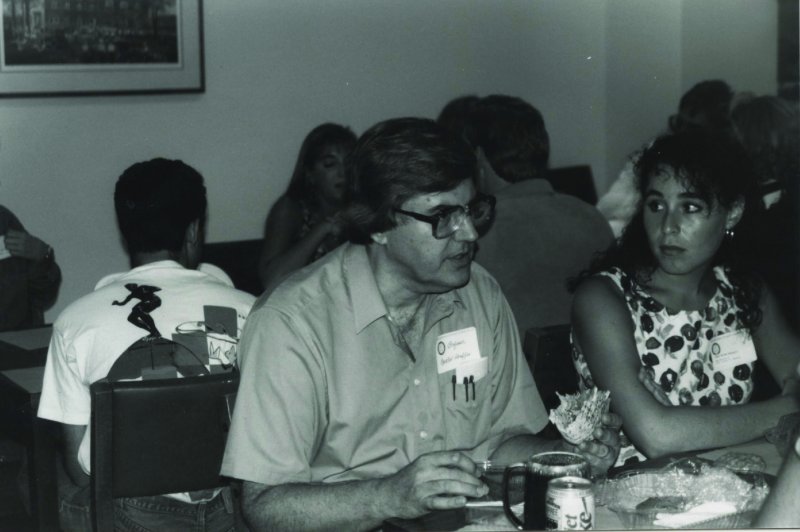
Thanks to Jane, and to Judy, Cathy, Warren, Tracy, Mike, and so many others for sharing their Butler stories. To me, the thing about his ubiquitous sense of humor was that he was joking, but he was still serious about the joke.
Years ago, when dispensers of liquid hand sanitizer first appeared next to the elevators in the BW building, he said, “Can you believe that? It’s fluoride all over again. Another conspiracy to suppress individual liberty!” I didn’t have a problem with a conspiracy to suppress the individual liberty of germs, but I think Butler actually did. He did NOT use the dispenser.
This was terrible news. Along with all of the joys of working for an institution for many years, including getting to witness the commitment and kindness of colleagues, there has been the pain of losing some of our best. I think of Butler as one of our cultural anchors; this is a hard loss.
